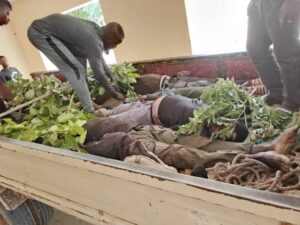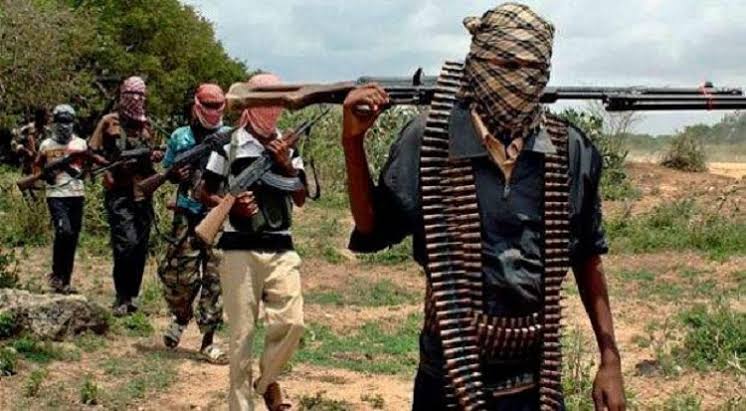Suspected Boko Haram or Islamic State West Africa Province (ISWAP) insurgents launched coordinated attacks on several communities in Adamawa State, Nigeria, causing widespread panic, grief, and outrage. The assaults, primarily targeting rural areas in Hong and Gombi Local Government Areas (LGAs), resulted in significant loss of life, property destruction, and displacement. These attacks highlight the ongoing security challenges in Nigeria’s Northeast, despite government claims of progress against insurgent groups.
The violence began in the early hours, with insurgents raiding multiple villages simultaneously. Eyewitnesses reported chaotic scenes as gunmen fired indiscriminately, burned homes and looted food supplies. In Hong LGA, communities like Kulda, Mayo Ladde and Zah suffered heavily, with Kulda alone recording at least 16 deaths and over 90% of its houses, including places of worship, destroyed.

In Gombi LGA, the attacks were equally devastating, targeting civilians and infrastructure. Earlier incidents in 2025, including four deaths on January 17 and a hunter’s killing on February 17, underscore the persistent threat. The insurgents, reportedly using sophisticated weapons and exploiting proximity to Sambisa Forest, overwhelmed local vigilantes, several of whom were killed while resisting.
The human cost has been immense, with dozens reported dead and many residents missing, raising fears of abductions, a common tactic of Boko Haram and ISWAP. Thousands, mostly women and children, have been displaced, fleeing to neighboring communities or makeshift camps. The Adamawa State Emergency Management Agency noted that displaced persons face severe shortages of food, shelter, and medical supplies, worsening the humanitarian crisis.
Residents and community leaders voiced deep frustration over the recurring violence. A Hong LGA leader, speaking anonymously, mourned the loss of vigilantes and civilians, criticizing the limited military presence in rural areas. Locals have repeatedly called for increased security deployments and better support for vigilante groups to counter the insurgents’ tactics.
The Nigerian government has faced criticism for failing to halt the resurgence of insurgent activities. Senate President Godswill Akpabio, in May 2025, acknowledged the challenge of porous borders, noting that some attackers may be foreign nationals. The Senate urged the establishment of a military base in Hong LGA to bolster security, but residents remain skeptical due to past unfulfilled promises and the military’s focus on banditry elsewhere.
Economically, the attacks have crippled local communities, disrupting farming and trading. Insurgents looted foodstuff and livestock, deepening food insecurity in Hong and Gombi LGAs. The destruction of schools and markets has further impacted education, with over 441,000 girls already out of school in Adamawa due to insurgency-related issues.
Security forces, including the Nigerian Army and vigilantes, have had some successes, such as killing six Boko Haram fighters in Madagali LGA in December 2021. However, the June 2025 attacks reflect a shift in insurgent tactics, with ISWAP using simultaneous raids and advanced weaponry. Reports indicate the group’s reorganizational efforts have strengthened its operations in northern Adamawa.
Government responses, including condolence visits like one led by Boss Mustapha in 2021, have been deemed insufficient by locals. Hong LGA chairman Waang Inuwa emphasized the need for a permanent military presence and better-equipped vigilantes. Without these, communities remain vulnerable to further attacks.
The attacks reflect a broader resurgence of jihadist violence across West Africa, with groups like ISWAP exploiting weak borders and overstretched militaries. Adamawa’s proximity to Sambisa Forest and socioeconomic challenges like poverty and lack of education create fertile ground for insurgency. Addressing these root causes is critical to breaking the cycle of violence.
Recovery for affected communities remains challenging, with displaced families facing shortages and psychological trauma. Survivors in Kulda and Mayo Ladde described fleeing to forests and mountains to escape the violence. The government’s promises of enhanced security have yet to materialize into effective protection for these vulnerable areas.
A comprehensive approach, combining strengthened border security, increased military presence, and socioeconomic development, is essential to counter the insurgency. Until such measures are implemented, communities in Hong and Gombi LGAs will continue to face the devastating impacts of insurgent violence, with little respite from fear and loss.




